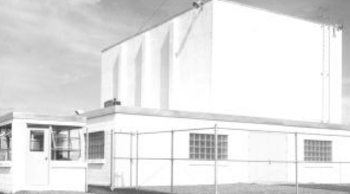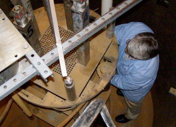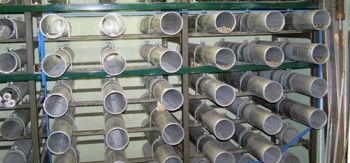
The RCF was originally built by the American Locomotive Company (ALCO), for the purpose of entering the evolving niche market for small, portable reactor plants. After winning a bid from the Atomic Energy Commission, ALCO built the prototype Army Package Power Reactor (APPR-1, later re-designated as SM-1), at the cost of $300,000, in 1954 in Schenectady, NY approximately 40 minutes from the Troy campus. The reactor was designed to use highly enriched (weapons grade) fuel and the prototype became operational after the startup on August 26, 1956. However, in 1963, ALCO decided to exit from the nuclear business and the ownership was transferred to the newly established nuclear engineering program at RPI which was rapidly expanding itsresearch and teaching. From 1963 to 1985, RPI used the existing high-enriched uranium fuel plates. However, since 1986/1987, the reactor has been operating with low-enriched uranium SPERT-type fuel pins.

The Walthousen Reactor Critical Facility is one of only 25 research reactors at U.S. universities. It is the only low power (less than 100 Watts) facility using fuel rods that are similar to those used in commercial light water reactors. Because of its design, the RCF is a unique facility that does not exist anywhere else in the nation and probably not the world. It is ideally suited for fundamental reactor physics measurements and benchmarks evaluating material specimens with relatively high reactivity worth, such as neutron control materials. Students can directly touch the core, without the concerns about loose contamination that often occur in other reactor facilities. In contrast, students working with other reactors are only able to read various instruments from a separate control room while a licensed reactor operator executes the experiment. For this reason, RPI’s NE students receive hands-on experience in experimental planning, radiation protection, and criticality safety. Additionally, students who are interested in pursuing a career in nuclear operations receive comprehensive training so they are licensed by the U.S. Nuclear Regulatory Commission for reactor operation. Over the years, the RCF has supplied a large pool of such licensed reactor operators for the U.S. nuclear power industry. The RCF is currently licensed by the USNRC to operate through June 26, 2031. Currently, the RCF is used to teach MANE-4440 Critical Reactor Laboratory, a required course for all undergraduate NE students, and for undergraduate and graduate research projects each year.

The Director of the RCF is Professor Peter Caracappa. Dr. Timothy Trumbull, an adjunct faculty and a full-time employee of the Knolls Atomic Power Laboratory, and Dr. Glenn Winters, formerly of the International Atomic Energy Agency and Knolls Atomic Power Laboratory, are the instructors of MANE-4440 Critical Reactor Laboratory offered each Spring. There are currently several licensed operators, mostly students, for the facility as required by the USNRC. The Nuclear Safety Review Board (NSRB), consisting of NE program faculty members, the Associate Dean of Engineering, the Radiation Safety Officer, and a Public Safety Officer, is an institute-wide governing body of the facility.